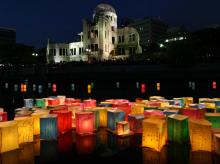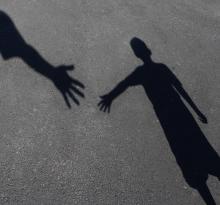atomic bomb

THIS AUGUST MARKS 80 years since U.S. president Harry Truman issued orders to drop atomic bombs on the Japanese cities of Hiroshima and Nagasaki. The impact was so terrible that no head of state has done so since. Yet, eight decades later, 12,000 nuclear weapons are deployed around the world — a veritable apocalypse-in-waiting.
While many people are accustomed to thinking of climate change as our existential threat, we may overlook that nuclear arsenals are the first global threat entirely of humanity’s own making.

Minus One, which premiered in U.S. theaters on Dec. 1, became the highest grossing Japanese live-action film in U.S. history.

Both films are sympathetic to creators, but neither film lets their creations off the hook. Oppenheimer worries aloud how the nuclear power he unleashed will shape the atomic age. Barbie faces a lunch table of schoolgirls who tell her exactly how the Barbie beauty standards made them feel un-feminine. But both films ultimately move beyond the myth of the single creator and focus on the forces that shape that creation’s ongoing impact on the larger world.

IN NOVEMBER, a stray missile from the Russia-Ukraine war landed in Poland, killing two men in their 60s who worked at a grain warehouse. It took several emergency meetings with NATO officials to determine whether Russia had intentionally escalated the war into the region of the Western military alliance. All parties deemed it an “accident.” (The missile came from Ukraine.)
What if that stray missile had a nuclear warhead?
Russian President Vladimir Putin’s threat to use nuclear weapons in Ukraine must be firmly condemned, as well as his cruel and illegal war with its continued escalation. But accidents happen. Even a limited or regional use of nuclear weapons could have planetary effects, blocking the sun enough to cause a global temperature drop, collapsing crop production, and resulting in massive starvation, according to a report by the International Physicians for the Prevention of Nuclear War.
As the Poland example shows, today we are facing the most serious nuclear threats since the Cuban missile crisis 60 years ago, which then-Secretary of Defense Robert McNamara said we survived only by luck.
Nuclear weapons raise biblical issues. The continuing survival of God’s creation and the human race cannot rely on just “luck” but instead needs providential intervention. A few weeks before the November missile crisis in Poland, Pope Francis said, “Today, in fact, something we dreaded and hoped never to hear of again is threatened outright: the use of atomic weapons, which even after Hiroshima and Nagasaki continued wrongly to be produced and tested.”

Confessing our own violence would not deny violence committed against us. Rather, an apology could call attention to war atrocities of the past and present on all sides. Admitting that the deadliest bombings in history had selfish strategic motivations, admitting that life was so thoroughly devalued and destroyed for no greater good (as if a greater good could exist) could force people on all sides to rethink the “necessities” of other wars past and present. Debunking one war lie could lead to the debunking of many war lies. And governments built on violence, powers upheld and strengthened by the looming threat of death, seek to extinguish the light of truth.

The White House announced May 10 that President Obama will travel to Hiroshima, Japan, reports The New York Times.
This will be the first time a sitting U.S. president has visited the city where the U.S. dropped an atomic bomb at the end of World War II.

Seventy years after the U.S. dropped an atomic bomb on the Japanese city of Nagasaki, Pope Francis on Aug. 9 described the bomb as a “lasting warning to humanity.”
Speaking to the faithful gathered in St. Peter’s Square, Francis recalled the “horror and repulsion” aroused by the twin bombings of Nagasaki on Aug. 9 1945, and Hiroshima, three days earlier.
“This (event) has become the symbol of mankind’s enormous destructive power when it makes a distorted use of scientific and technical progress,” he said.

The destruction of Hiroshima and Nagasaki, by any civilized standards, represented one of the moral low-points in human history. After all, by very conservative estimates, 135,000 people died from the atomic blasts—most of them civilians, the victims of the intentional targeting of cities. Think about that—these weren’t military targets, but cities full of men, women, and children, going about their lives, destroyed in seconds by the most destructive weapons ever invented.
But the point of memorializing isn’t about the past. It’s about ensuring such things happen “never again.”

Like many of my millennial peers, I was barely in diapers when the Cold War ended, never practiced fallout drills in school, and only recently learned what those yellow-and-black signs on old buildings meant. As a kid, if I thought about nukes at all, it was in a passive tense, World War II-history sort of way. In other words: not my problem.
But as we mark the 70th anniversary of Hiroshima and Nagasaki — when U.S. aircrafts dropped bombs on two Japanese cities, killing 135,000 people, by conservative estimates — I spent some time in the Sojourners archives trying to fill the gaps in my nuclear education. Here’s what I found.

As we mark the 70th anniversary of the atomic bombings of Hiroshima and Nagasaki, the world waits to see if the Iran deal will come to fruition and thus avoid war. Once again, the debate about nuclear weapons appears at the forefront. At the same time, inside the U.S., the #BlackLivesMatter movement continues to make clear it will no longer be politics as usual as activists organize, protest, and fight every day to destroy institutional racism. However, it is no coincidence that these events are all happening simultaneously as they have always been and continue to be inextricably linked.

ONE DAY, WHEN I was a student at Christ the King Elementary School in my hometown of Richland, Wash., the nuns gathered all the kids, two by two, and walked us outside to the parking lot. There sat a mobile van emblazoned with the logo of the Atomic Energy Commission and the words “Whole Body Scanner.”
One at a time, we were led into the van, where we laid on a white-sheathed table beneath a large, (scary), medical-looking machine. There was a whirring sound, and after a minute or two we were told to get up and make room for the next child. We weren’t told what the process was for, but it’s safe to assume that the government was interested in the effects of radiation on those of us who were “downwinders” from one of the nation’s largest nuclear complexes.
Richland was (and is) the bedroom community for the Hanford Nuclear Reservation. Hanford was built in the 1940s as part of the Manhattan Project, the massive wartime program that led to the atomic bombs dropped on Hiroshima and Nagasaki at the end of World War II. Hanford’s role was the production of plutonium for the world’s first nuclear weapon, the “test” bomb detonated in New Mexico a few weeks before Hiroshima, and for the bomb that destroyed Nagasaki three days later.
Those weapons were dropped 69 years ago, but the debate about their morality continues. It emerged again this spring when the two Missouri senators proposed renaming D.C.’s Union Station after Harry S. Truman, who authorized history’s only nuclear attack on people. One commenter in a related discussion wrote, “I have a problem with judging past cultures by today's standards. To end WWII we dropped bombs on cities filled with innocent civilians. By today's standards that would be condemned. Are you willing to say we should not have done that to end WWII?”

Sixty-seven years ago today, at 8:15 on the morning of August 6, 1945, it was a sunny morning in Hiroshima, Japan, a city of more than 300,000 people. Some were on their way to work, children were playing in the streets. Suddenly the sky exploded in a brilliant and hellish flash of light as a 15 kiloton nuclear bomb was dropped from a U.S. plane in the sky overhead. More than 70,000 people were instantly killed, some with their bodies etched into the pavement like eerie shadows. By the end of the year, as many as 140,000 had died, after five years, the toll was estimated as high as 200,000. Three days after Hiroshima, on August 9, 1945, a second nuclear bomb was used against Nagasaki, Japan. An estimated 75,000 people were killed in that explosion.
Today, according to the Associated Press, the annual ceremonies held in Hiroshima’s peace park to commemorate the bombing were attended by 50,000 people, including representatives from 70 countries. Two Americans with family ties to the bombings also attended.

Among my must reads are the Sunday New York Times Book Review and other book reviews I come across in various media outlets. There are too many books being published that I would love to read, but just don’t have the time. So, I rely on reading book reviews as one way of keeping in touch with what’s being written.
Here are my picks in this week’s books of interest:
Recently, Wikileaks, an online whistleblower site, released a video which was dubbed "Collateral Murder." I write as a former member of the Infantry c
